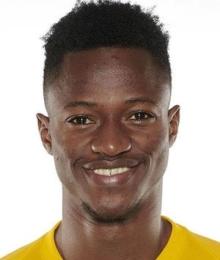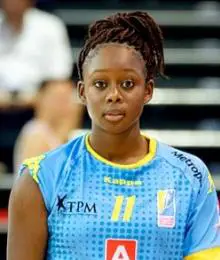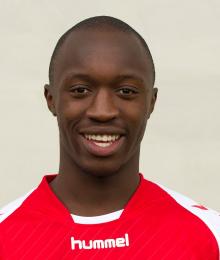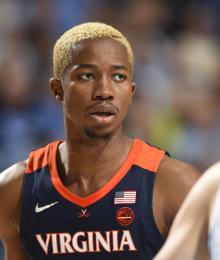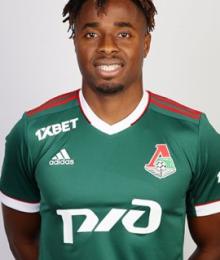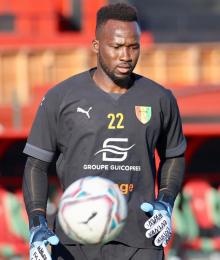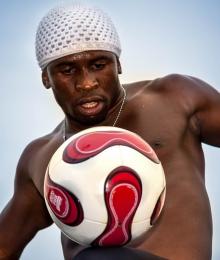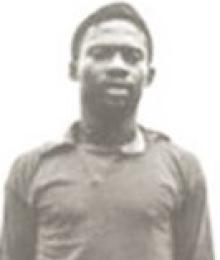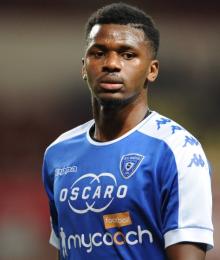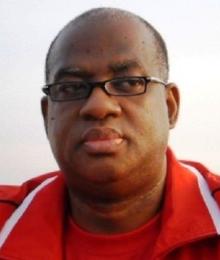
Salifou Camara, known as "Super V," was an influential Guinean businessman and football administrator who significantly shaped Guinea's football landscape. Born in the late 1950s in Conakry, he built his fortune in precious stones trading and real estate before acquiring the SOCOMER supermarket (which gave him his nickname) and several gas stations. His football career began in 1994 as vice-president of the Guinean Football Federation (FEGUIFOOT), before becoming its president twice (2000-2001 and 2011-2017).
His leadership was marked by infrastructure development, political connections—notably his friendship with former president Alpha Condé—and a fierce rivalry with Antonio Souaré. Despite controversies, including imprisonment and exile, he remained deeply committed to Guinean football until his death following a stroke in Paris on July 15, 2024, leaving behind a complex legacy as both a visionary leader and a controversial figure in Guinean sports history.
Introduction
Salifou Camara, better known as "Super V," was an iconic figure in Guinean football who left his mark on the history of the sport in Guinea. A successful businessman and influential sports administrator, he dedicated a large part of his life to developing football in his country. His journey, characterized by successes, controversies, and fierce battles, reflects a complex and passionate personality who forged strong connections in both sporting and political circles. Having passed away on July 15, 2024, in Paris, he leaves behind a considerable legacy for Guinean football.
Youth and Early Business Career
Born in Conakry in the late 1950s, Salifou Camara grew up in post-independence Guinea. A brilliant student until the 13th grade (equivalent to senior year of high school), he decided to abandon his studies to enter the business world, particularly in precious stones trading and real estate. His business acumen and entrepreneurial vision quickly allowed him to stand out in a country where the economy was still largely controlled by the state under the PDG (Democratic Party of Guinea) regime.
In the 1970s and 1980s, young Salifou was already making a name for himself in Fria, an industrial city in Guinea, where he frequented the local swimming pool with his cousins Paul Camille and Jean Bangoura. Always elegant and generous, the man already affectionately known as "my friend" impressed with his opulent appearance and financial availability, often covering leisure activities for his companions.
Rise as a Businessman
After the regime change of April 3, 1984, which marked the end of Guinea's First Republic, Salifou Camara seized the opportunity offered by the new liberal economic policy. He became one of the first Guinean entrepreneurs to benefit from this opening, securing important public contracts for supplies and services for the administration.
His entrepreneurial success was notably illustrated by the acquisition of the SOCOMER supermarket, which he renamed "Super V" (the origin of his nickname), as well as several public gas stations. These strategic investments made him an influential and financially solid businessman in 1990s Guinea.
Entry into the Football World
His passion for football, evident from his youth when he regularly attended the September 28 Stadium in Conakry, naturally led him to the governing bodies of the sport. In 1994, his status as a respected businessman and his significant financial means opened the doors to the Guinean Football Federation (FEGUIFOOT), where he was appointed vice-president.
In 2000, when Dr. Baba Sacko, then president of FEGUIFOOT, was appointed ambassador to Algiers, Salifou Camara "Super V" became interim president. This first mandate, although brief, allowed him to launch significant projects, notably the acquisition of land in Teminètaye and the beginning of negotiations with FIFA for financing the future federation headquarters.
First Ordeal and Relationship with Alpha Condé
His mandate was abruptly interrupted in 2001 when the Sports Minister at the time, Kader Sangaré, dissolved the Executive Committee of FEGUIFOOT following poor sporting results. This dissolution, contrary to FIFA regulations, led to Guinea's suspension from international competitions and the disqualification of the cadet team from the 2001 African Cup of Nations final.
This crisis triggered an open war between Salifou Camara and Minister Sangaré. At the same time, the Guinean state, seeking to punish the man they considered responsible for the international sanctions, launched investigations into the public contracts obtained by his companies. The National Committee for the Fight Against Corruption (CNLCS) accused him of irregularities in a contract for the supply of tax stamps, which led to his arrest and imprisonment at the central prison of Coronthie.
It was in prison that he met Alpha Condé, the RPG leader arrested after the 1998 presidential election. This meeting forged a solid friendship between the two men that would play a decisive role in the future of their respective careers. During his detention, Salifou Camara showed unwavering determination to fight the accusations against him and eventually prevailed in a long and complex legal procedure.
Return to Business and Political Influence
After this ordeal, Salifou Camara temporarily adopted a low profile, aware of his vulnerability. However, he returned to the spotlight thanks to his proximity to Mamadou Sylla, a businessman who had become President Lansana Conté's new favorite. Appointed vice-president of the National Business Council (CNP-Guinea), Salifou Camara became Sylla's eminence grise, exercising a discreet but real influence on the allocation of public contracts and even on the composition of governments between 2002 and 2008.
This period testifies to his political skill and ability to adapt to regime changes. With Fernand Bangoura and Fodé Moussa Sylla, he created UDIBAG (Union for the Integrated Development of Lower Guinea), consolidating his economic and political influence throughout the country.
His privileged link with Alpha Condé also proved decisive before the 2010 presidential election. Salifou Camara played a role as intermediary between the RPG candidate and General Sékouba Konaté, then president of the transition, facilitating the contacts necessary for Alpha Condé's campaign.
Triumphant Return to FEGUIFOOT
The election of Alpha Condé as President of the Republic in 2010 changed the situation for Salifou Camara. Eager to repair what he considered an injustice, the new president supported his friend's return to the head of the Guinean Football Federation. On August 18, 2011, "Super V" was elected president of FEGUIFOOT with 78 votes out of 118, ten years after his forced departure.
This second presidency, which benefited from state support, allowed him to realize several major projects: the FEGUIFOOT headquarters, the Nongo technical center, and the housing unit for national teams. Under his leadership, Guinea also gained visibility and representation on the international football scene.
Complex Relationship with Antonio Souaré
The story of Salifou Camara "Super V" cannot be told without mentioning his tumultuous relationship with Antonio Souaré, a businessman and president of Horoya AC. This relationship, initially cordial or even friendly, gradually transformed into a fierce rivalry.
The decisive meeting between the two men took place in January 2012, during the African Cup of Nations co-organized by Gabon and Equatorial Guinea. Antonio Souaré, already an important figure in Guinean sports, then became president of Horoya AC in March 2012, on the recommendation of Laye Oumar Koulibaly, a mutual friend and member of the FEGUIFOOT executive committee.
Despite initial tensions, notably during an unsuccessful attempt to replace Salifou Camara with his vice-president Djibril Diarra Becken in 2013, a reconciliation was organized in Casablanca in November of the same year. This meeting, facilitated by Almamy Kabèlè Camara, Guinean vice-president of CAF, marked the beginning of a period of close collaboration between the two leaders.
Salifou Camara then developed an almost reverential admiration for Antonio Souaré, whom he now called "my brother." He facilitated his access to the highest levels of international football, as during the 2014 World Cup final in Brazil, where he obtained places in the presidential box at the Maracana. He also introduced Antonio Souaré to the FIFA president at the time, Joseph Sepp Blatter.
This collaboration extended to the political domain when, in March 2015, Salifou Camara facilitated a meeting between Antonio Souaré and President Alpha Condé during an Air France flight. This meeting strengthened Antonio Souaré's position with the government.
The Break and Open Warfare
However, tensions within the FEGUIFOOT executive committee, particularly with Vice-President Amadou Diaby, eventually deteriorated this understanding. In March 2016, an uprising of 11 members of the executive committee erupted against Salifou Camara, who refused any mediation despite the advice of his close associates.
The crisis led to the installation of a normalization committee by CAF and FIFA, chaired by Mohamed Lamine Nabé. It was at this point that Salifou Camara began to suspect Antonio Souaré of supporting the insurrection against him.
On February 28, 2017, Antonio Souaré was elected president of FEGUIFOOT, marking the beginning of an open war between the two men. Salifou Camara then multiplied accusations against his successor, going so far as to seize the FIFA ethics commission for alleged violations of the ethics code.
In response, a complaint from Antonio Souaré concerning an audit reporting the withdrawal of 800,000 euros to finance Guinea's bid to host the 2019 and 2021 African Cup of Nations led to legal proceedings against several of Salifou Camara's associates, forcing him to go into exile for several months.
Final Years and Legacy
Despite this exile and legal proceedings, Salifou Camara continued his fight from Paris. He joined ASK as secretary general, which allowed him to formalize his complaints against Antonio Souaré with FIFA.
On July 30, 2019, in a significant gesture, President Alpha Condé appointed Salifou Camara to the Board of Directors of the Webb Fontaine Group, the company in charge of the single window for foreign trade in Guinea. This appointment marked his return to the country's economic circles of influence.
Salifou Camara "Super V" passed away on July 15, 2024, in Paris, following a stroke, after being hospitalized in a coma at Bichat Hospital. His legendary discretion accompanied him until his final moments, as few people were aware of his health condition.
Conclusion
The journey of Salifou Camara "Super V" reflects the tumultuous history of Guinean football and more broadly of contemporary Guinea. A man of character, visionary and passionate, he made significant contributions to the development of the country's football infrastructure while skillfully navigating the turbulent waters of Guinean politics and business.
His legacy remains complex: admired by some for his determination and achievements, criticized by others for his sometimes controversial management and combative methods, Salifou Camara "Super V" undeniably remains a major figure in Guinean football, whose name will remain associated with a pivotal period in its history.
As his older brother Gilbert Camara emphasized: "What I remember about him is his passionate love for Football. He invested a lot in the success of this sport in Guinea." This is probably how history will remember Salifou Camara "Super V": a man who loved Guinean football so much that he made it the fight of his life.











